- Home
- Tricia Stringer
Dust on the Horizon
Dust on the Horizon Read online
About Tricia Stringer
Tricia Stringer is the bestselling author of the rural romances Queen of the Road, Right as Rain, Riverboat Point and Between the Vines, and the historical saga Heart of the Country, the first book in the Flinders Ranges series.
Queen of the Road won the Romance Writers of Australia Romantic Book of the Year award in 2013 and Riverboat Point was shortlisted for the same award in 2015.
Tricia grew up on a farm in country South Australia and has spent most of her life in rural communities, as owner of a post office and bookshop, as a teacher and librarian, and now as a full-time writer. She now lives in the beautiful Copper Coast region with her husband Daryl. From here she travels and explores Australia’s diverse communities and landscapes, and shares this passion for the country and its people through her stories.
For further information go to triciastringer.com or connect with Tricia on Facebook or Twitter @tricia_stringer
Also by Tricia Stringer
Queen of the Road
Right as Rain
Riverboat Point
Between the Vines
THE FLINDERS RANGES SERIES
Heart of the Country
TRICIA STRINGER
Dust on the HORIZON
www.harlequinbooks.com.au
For Steven
Contents
About Tricia Stringer
Also by Tricia Stringer
Prologue
One
Two
Three
Four
Five
Six
Seven
Eight
Nine
Ten
Eleven
Twelve
Thirteen
Fourteen
Fifteen
Sixteen
Seventeen
Eighteen
Nineteen
Twenty
Twenty-one
Twenty-two
Twenty-three
Twenty-four
Twenty-five
Twenty-six
Twenty-seven
Twenty-eight
Twenty-nine
Thirty
Thirty-one
Thirty-two
Thirty-three
Thirty-four
Thirty-five
Thirty-six
Thirty-seven
Thirty-eight
Thirty-nine
Forty
Forty-one
Forty-two
Forty-three
Forty-four
Forty-five
Forty-six
Forty-seven
Forty-eight
Forty-nine
Fifty
Author’s Note
Acknowledgements
Prologue
1868
In the bottom of the dry creek bed, the heat pressed like a weight on the motionless figure sprawled beneath the branches of the massive red gum. The sun had burned his pale skin to red and sucked the moisture from his body but the boy was still alive. He had crawled to the shade to gain some respite from the relentless rays and to conserve his energy for one last look. There was a mouthful of precious water in the bag on his hip and he was taking a gamble. At stake was his life.
He had been following the meandering creeks through the hills for three days. Each time he thought he’d found a way through, he had been confronted by steeper, more impassable hills and he had been forced to retrace his steps and take another course. The land that stretched out behind him was parched. There was little water for the few sheep that had managed to survive the blistering hot winds and evade the wild dogs.
The remaining hardy stock had become impossible to shepherd and he had given up all hope of saving any of them when, somehow, they’d ended up higher into the ranges than he’d been before. He’d been about to turn back and leave the sheep altogether when he’d found a small waterhole that hadn’t dried up and his spirits had lifted.
Then, in the late afternoon, he had seen several kangaroos and a flock of screeching birds. They had to be getting water nearby. He’d left his horse to try to climb a rocky outcrop for a better view of his surroundings. A startled kangaroo had bounded away and scared his untethered horse off, with his swag, food and extra water tied to its saddle. All he had was his water flask. He’d fallen to the ground in despair, thinking it was the end. Just in front of him something sparkled. His hand curled around the rock and his eyes closed.
The sun lowered in the sky as he gathered his strength for one last attempt. He would probably never be found anyway. If he was going to die he wanted to do it looking out over this ruthless land he’d been born in and loved. He staggered to his feet and drained the last precious drop of water into his parched mouth.
Ahead of him the tall sides of the narrow gorge glowed red. The creek bed in front of him was choked with old gums, young saplings and an assortment of timber debris, washed there in some previous time of flowing water. Above him a flock of screeching birds flew in and disappeared inside the gorge.
The boy stumbled on towards the impeding bush. He clasped the rock in one hand and rubbed at his eyes with the other. Black dots swirled in front of him. He peered closer. There was a gap, a path though the saplings. He pushed on through the overhanging leaves and his tattered boots sunk into the ground. Cold registered in his seared brain. He looked down. Damp grit encased his boots. Several sets of animal tracks indented the sand.
Up ahead he glimpsed a glint but he didn’t dare hope. He sucked in a feeble breath and, with a final push, surged forward. Beneath his feet the soft sand gave way and he fell headfirst into the pool. The flock of large white birds rose from the surrounding trees screaming their protest.
On the ridge above, a shadow moved and took the shape of a man. Binda had been motionless for some time. And even though he no longer feared the figure sprawled below him, the young Aborigine had thought it best to be cautious.
Hunting alone, Binda had been terrified the day before when a huge four-legged animal had crashed through the trees like a wild monster. Once the bush around him had settled, Binda had resumed his hunt for kangaroo, only to be startled again by strange footsteps crunching on the ridge above him. Binda had followed the young white boy ever since, watching him become more and more helpless. Stories were told around the campfire about the pale-skinned men who trampled the bush and spoiled food and water with their animals and the large loads they carried but Binda had never seen one until now.
He took small silent steps down the ridge. Now that life had finally left the intruder, Binda couldn’t walk away. He was curious to get a better look and he knew if he didn’t move the body the rotting flesh would spoil the waterhole.
The setting sun glowed on his glossy skin as he made his way down the ridge. Once he was in the creek bed he knew he could blend with ease into the shadows if he needed to but he was no longer afraid. Binda was thinking about the elaborate story he would have to tell around the campfire. He would be able to describe in great detail what a white man looked like. He pushed through the last clinging branches at the side of the waterhole and froze. His eyes opened wide in surprise and then fear surged once again through his veins. At the edge of the pool, the sand showed the signs of the intruder but the body was gone.
One
1881
Jack Aldridge’s feet left the ground and his head tilted sideways. He flew out the door with the help of strong hands on his back, and landed sprawled face first in the mud.
“Don’t come back again, you black trash,” Smedley’s voice boomed behind him. “Unless you’ve got more money to lose, Jackie Boy.”
Raucous laughter echoed in his ears then the door slammed shut and he was in dark
ness. Jack dragged himself to his feet and leaned against the slimy wooden board wall of a storage shed. He looked down at his last set of half-decent clothes. They were coated in mud and whatever other filth trickled along the lane between the storage sheds at the port. He put one dirty hand to his jaw and moved it from side to side, then he ran his tongue over his teeth. Nothing broken. He slammed his fist into the wooden wall. The pain of it barely registered.
Smedley had fleeced him. Jack could have beaten the cheating bastard to a pulp on his own but the other card players had rallied around, all whites, and one of them had a knife. Jack stood up to his full six feet and looked back at the door. He’d get Smedley another time when the man didn’t have helpers. They’d cheated him of his money, beaten him up and tossed him in the street like rubbish. Hatred burned deep in his chest. It rose to the surface easily after years of being treated like something people stepped on.
Jack made his way along the lane and turned into the dark road. A fine sea mist hung in the air, enveloping Port Augusta in its salty tendrils. The shadows of the huge wool stores loomed above him, black against an even blacker sky. No moon tonight, but further down the street there was a lamp outside the Flinders Hotel. He made his way in that direction and went round the back to the stables, found a trough with some water and scrubbed his face and hands. There was nothing he could do about his clothes but at this hour of the night he doubted anyone would notice. He removed his boot and pulled out his last stash of coins; enough to buy some liquor and help him forget his useless state for a while.
When he left the hotel several hours later, the only thing he felt was the anger still smouldering in his chest. In spite of the liquor he’d swallowed his strides were steady as he made his way along the back streets to the house he hadn’t seen for several years.
He stopped when he reached it. The two-storey building was made of wooden boards and had a picket fence at the front which leaned at a precarious angle. It was hard to see much about the state of the building in the darkness and no welcome light shone from the windows but he suspected nothing much would have been done to it in the four years since Ned had died.
Briefly his thoughts softened at the memory of the man who’d been the only father he’d known. He gripped the wobbly fence post and pushed the image of Ned away. In Jack’s world there had never been any place for sentimentality. Ned was gone, but Jack hoped Ethel still lived here. The old woman was the reason he’d come back to the port. There had been several jobs taking him to various parts of Victoria and then back to South Australia but they hadn’t lasted. Someone always found fault with his work. Now he was in desperate need of money and a place to stay. He doubted Ethel would have much cash but he was sure she could provide the information he needed to unlock another source of income for him. He stumbled on the verandah step, crouched down and felt for the rock. It was still there. He lifted it and retrieved the front door key.
It took him a moment to get the key in the lock and a jiggle to get it to turn but finally he was inside.
“Stay where you are.” A bulky figure loomed from the door to his left.
“Mam, it’s me.”
There was a gasp. “Gawd sakes, is that you Jackie Boy?” She reached a hand towards him but he pushed past her in the narrow hallway and made for the tiny kitchen at the back of the house where he hoped there’d be a fire.
She followed him, lit a candle and held it up close to him. “What have you done to your face and what’s that smell? You been rolling in cow shit, Jackie Boy?”
Anger filled Jack’s brain. How he despised the name Jackie Boy. It had been used as a taunt so many times it stirred instant rage when he heard it.
“Jack,” he yelled in her face. “My name is Jack.”
“Settle down. I’ve got tenants upstairs you know. Paying customers.” Ethel poked a finger in the air towards the ceiling then she poked him. “Anyway don’t get yourself in a twist. It’s only a term of endearment from your old mam who hasn’t seen you for four years.”
“You’re not my mother.”
Ethel pursed her lips. A small frown turned her wrinkled brow to furrows. “No, but I did my best to be one for ya and you always called me Mam. I guess you’re too old for that now. Ethel will do.” She turned her bulky figure and shuffled to the fire. She was even bigger than she’d been the last time he’d seen her and her movements weren’t as sure. She poked at the fire and added more wood. “Would you like a cup of tea?”
He slumped into a chair at the battered table that wobbled unevenly as he placed his elbows on it. “I’d rather some of your whiskey.”
Ethel straightened and put her hands to her hips. She wore a loose gown over her nightdress and a cap on her head. She looked like a ship under full sail. “Would ya now?” She studied him closely in the dim light. Then she grinned. “Well I wouldn’t be past having one myself. A bit of a nightcap to ease me aching bones.”
She put two mugs on the table and went to the cupboard built into the corner of the room. He watched as she extracted an earthenware pot and poured some pale liquid from it into the mugs. Ethel and Ned had made their own brew for as long as Jack could remember. They’d run a pub in the hills behind Port Augusta when he’d first gone to live with them as a boy of nine. When that closed they’d moved to the Port but they’d never had much success there. Ned had died a poor man.
Ethel sat opposite him and took a swig from her mug. He did the same. The liquid was smooth as silk and warmed him all the way to his stomach.
“You haven’t lost your touch.” Jack wiped the back of his hand across his mouth. The smell of something rotten lingered in his nostrils. He’d need to wash, clothes and all. He’d learned early that people were quick to judge an ill-dressed unkempt half-caste, as they called him. Jack liked to keep himself tidy.
“Ned was better at brewing beer. I’ve always been able to turn my hand to a good drop of the stronger stuff.”
Jack glowered at her across the table and drained his mug. He put it back on the table in front of her. “I think I need to test it further.”
She eyed him a moment then poured him some more. “What’s brought you back here after all this time with never a word?”
“I’m a bit down on my luck.”
Ethel hissed through her teeth. “If you’ve come here looking for money you can forget it. You can see this place is falling down around my ears. My lodgers barely pay enough to keep me clothed and fed without having any to give away to the likes of you.”
“You owe me.”
She snorted. “What for?”
“All the years I worked for you for nothing.”
“Nothing.” Ethel’s beady eyes bulged. “Ned and me put a roof over your head, fed ya and clothed ya. That’s not nothing.”
Jack felt the fire from the whiskey spread to his arms. He clenched his fists as her words continued to pour out.
“You always did have ideas above your station. We only took ya in ’cause we felt sorry for ya. Your poor mother came to us begging for help to look after you and your little brother. When they took sick and the little one died and she knew she was going too, your mother implored us to look after ya. We only did it for her. Dulcie was a good sort. Her downfall was taking up with that scoundrel of a man. His poor wife never knew he had a black family hidden in his hut in the hills behind the pub. Didn’t think we knew about it, Ned and me, but we did.” She leaned across the table and smirked. “Not only are you a bastard, Jackie Boy, but you’re a black bastard.”
Jack leapt up from his chair, knocking it to the floor. He leaned across and slapped Ethel’s smug face. The shock of it silenced her. She put a pudgy hand to her cheek. Jack glowered at her. How many times had the reverse happened? She never let Ned see how she treated the boy they’d taken in but she was always quick to dish out a slap or a backhander if she was displeased with Jack about something. That had been a regular occurrence.
“I always knew you’d turn on us one day.” Ethel his
sed at him. “I’m just glad me poor Ned isn’t here to see it after all we’ve done for—”
“Shut your flapping mouth.” He raised his hand again.
She kept her piggy gaze on him but she remained silent.
“I need a bath and somewhere to sleep.” He reached across the table and felt some small satisfaction as she jerked back. He picked up the pot of whiskey and poured himself a mug full then he sat down. “But first I want to know about my father.”
“He’s dead.”
Jack had always been told that but he’d held a hope that somehow it wasn’t true. “How can you be sure?”
“He wasn’t in much of a state when they found his body but my dear Ned recognised his clothes and his hair. There’s no doubt it was him. He was a nasty piece of work, Jackie … Jack.” Ethel drained the last of her liquor and plonked her mug on the table. “Better for everyone he was dead.”
Jack wasn’t so sure. He had vague happy memories of his mother, his baby brother and the white man who used to visit them at the hut in the hills. They were all dead now but there was still another side of the family he knew nothing about.
“What was his name?”
“What does it matter? You have a name.”
Jack did. He’d been given the name Aldridge, same as Ned and Ethel, but he needed a name if he was to track down his father’s family.
“He had a wife. Not my mother, a white wife. She was the woman he implored to help him when my uncles dragged him away.”
Ethel’s eyes widened. “Were’d ya hear that? You were too young to remember what happened.”
“I was nine when my father died. Before that I grew up in two places, I lived in the bush with my mother’s black family and a wooden hut when my white father visited.” He drew himself up and looked across the table but he was looking through Ethel rather than at her. “I remember my uncles being angry with my mother and coming to take my father away. I thought they were just going to beat him. Teach him a lesson.”
“Oh, they did that all right. Both his legs were broken. He was probably still alive when they finished with him but he had no way to get out of the creek where he was found.”

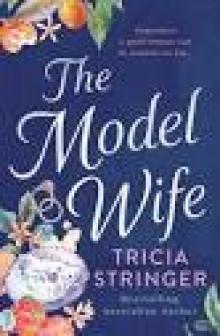 The Model Wife
The Model Wife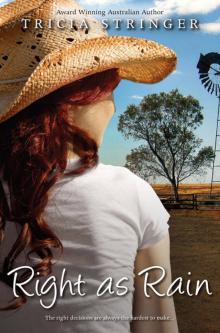 Right As Rain
Right As Rain Something in the Wine
Something in the Wine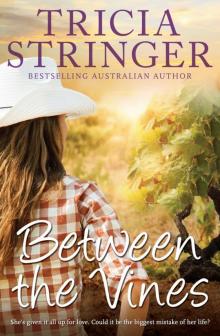 Between the Vines
Between the Vines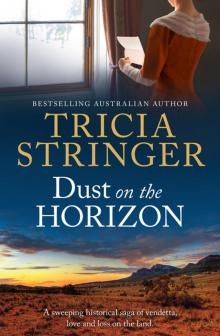 Dust on the Horizon
Dust on the Horizon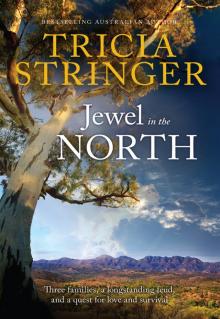 Jewel In the North
Jewel In the North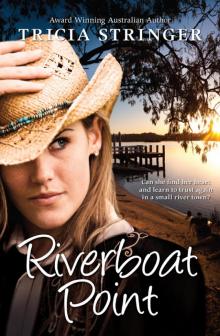 Riverboat Point
Riverboat Point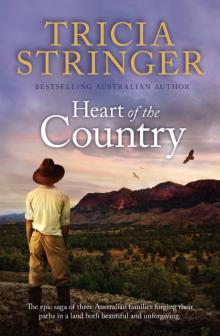 Heart of the Country
Heart of the Country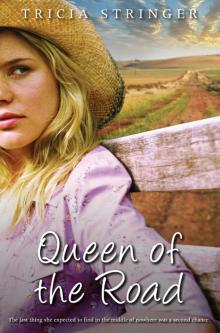 Queen of the Road
Queen of the Road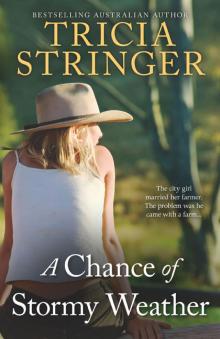 A Chance of Stormy Weather
A Chance of Stormy Weather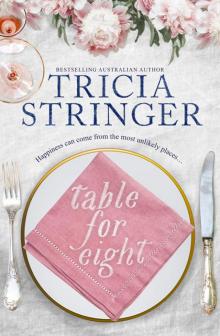 Table For Eight
Table For Eight